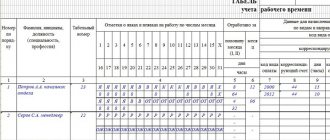Home / Labor Law / Employment / Part-time and part-time work
Back
Published: 08/05/2016
Reading time: 7 min
0
2961
Finding additional sources of income besides their main job worries many working citizens. Such a combination of two or more jobs is not prohibited by law, provided that the additional work will be performed during free time from the main job duties. The question of part-time work may also arise for women on maternity leave.
Although this category of workers is paid a benefit, it may not cover the costs of preparing for the birth of a baby or buying things for him after the birth. If the mother feels well and is able to work, she may well get a part-time job. After all, this type of employment implies part-time work, which gives the opportunity to relax and take care of the newborn.
- What does the law say?
- Part-time work for pregnant women
- Work before and after childbirth, wages
- Some features and design
Features of registration of part-time work
To apply for a part-time job, the employee writes an application for employment and brings the necessary documents to the new employer. Registration in the labor force is not mandatory and is done at the request of the employee. All the details of part-time work are included in the employment agreement. As a rule, the following nuances are specified:
- The number of working hours is at most half that of the normal schedule. In this case, you can reduce the hours in the day or days in the week.
- The parties to the agreement, by agreement, establish the optimal option for employment and salary.
- The contract is terminated if an applicant applies for the position of a working mother, for whom this position will be the main job.
Part-time employees working on maternity leave have some advantages:
- The right to take out maternity leave and leave to care for the baby;
- The employment agreement cannot be terminated at the suggestion of management;
- A probationary period is not established for them (Article 70 of the Labor Code of the Russian Federation).
The creation of a favorable work atmosphere is guaranteed for women on maternity leave by the legislation of the Russian Federation.
If an employee is working under a fixed-term agreement and its validity period ends before the birth, the employer is obliged to extend it until the end of the pregnancy. The basis is an application from the pregnant woman and a certificate from a medical institution confirming her situation.
| ★ Manual “How to calculate maternity benefits in a new way in 2021” (practical examples, complex cases, step-by-step instructions) purchased > 2600 |
Application for a part-time job
The employee’s desire to work on maternity leave is confirmed by writing a statement addressed to the manager. After reviewing it, the director issues an order. If a woman on maternity leave decides to take a part-time position, she writes a job application in the generally accepted form.
If a woman is listed as an external part-time worker and wants to leave the labor and employment leave early, she must also notify the employer about this. The application shall include the following information:
- Header: position, full name of director and employee.
- Basic text with a request to interrupt your vacation, date of return to work, desired schedule and conditions. In particular, the document should reflect: the type of incomplete schedule; number of working hours per day (week); start and end times of work; duration and time of breaks for feeding, rest and lunch.
- Date of compilation, signature, surname of the employee.
Working while on sick leave for maternity leave
At the antenatal clinic, the expectant mother is issued a sick leave certificate for pregnancy and childbirth at the 30th week of pregnancy. From this moment on, she may not go to work for 140 days (with a “classic” birth).
This time will be paid for by the state of their social insurance fund. If it is more profitable for a woman to work, then she can do it as usual, without taking maternity leave.
After the birth of a child, a woman also has the right to go to work before the end of her maternity leave, but this requires the good will of the employer.
Read more: Validity of the parking prohibited sign on even dates
Sick leave is paid based on the use of days of incapacity for work.
On days when a woman works, she is paid a salary. It is impossible to receive salary and compensation for loss of earnings at the same time.
Procedure for accepting a part-time worker
The Labor Code of the Russian Federation does not contain special rules regarding part-time work during the period of leave under the BiR. Women on maternity leave are subject to legislation for pregnant women and women with children under 3 years of age.
Situation 1. The expectant mother went on maternity leave and received B&R benefits at the basic rate and external part-time work. I decided to start extra work early. The procedure for resuming work is as follows:
- Visit the employer, discuss the exit time, working hours, etc.;
- Write an application addressed to the manager for early departure from vacation, indicating the agreed work schedule and date of departure;
- The accountant must recalculate the amount of the B&R benefit;
- The overpayment will be sent towards future earnings or will be collected from the employee;
- If the employee refuses such conditions, the organization has the right not to allow her to leave her vacation early.
Example. Recalculation of benefits when leaving maternity leave before the due date
A. N. Solomina worked as an external part-time worker for three years with a salary of 14,500 rubles. She presented sick leave for 140 days in connection with the leave for the BiR (from 06/27/16 to 11/13/16). She was paid in the amount of 66,739.40 rubles. For personal reasons, Solomina decided to leave maternity leave early and began work on October 1, 2021, i.e. 44 days ahead of schedule. The accountant made the following calculations:
66,739.40 / 140 * 44 = 20,975.24 rub. — overpayment of benefits under the BiR.
The employee agreed to take the overpayment into account towards future salaries. So, she will work for free in October and part of November.
Situation 2. During maternity leave, an employee found a new job on a part-time basis. Hiring for her takes place in the generally accepted manner. The exception is the inclusion in the employment agreement of clauses related to guarantees for women with small children.
| ★ Best-selling book “Calculating sick leave and insurance premiums in 2018” for dummies (understand how to calculate insurance premiums in 72 hours) 3000+ books purchased |
How to apply for part-time work while on maternity leave
Special entries about being on maternity leave are not made in the work book and, in fact, you are a full-time employee. Therefore, part-time maternity leave is formalized in the usual manner.
Part-time registration
To work part-time while on maternity leave, you must provide the following documents:
- application for a position;
- copies of passport and TIN;
- copies of education documents;
- extract from the work book.
Since, by law, the work book must be kept by the main employer, it is not necessary to submit it when registering a part-time job, however, you may be asked to provide a copy of the spread with the last entry.
When applying for a job, you are required to provide an employment contract. The latter must contain the following information:
- name and number of the document;
- date of signing;
- subject of the contract;
- rights and obligations of the parties;
- terms of remuneration;
- place of work (address of enterprise, department);
- work schedule or workload;
- termination procedure and validity period;
- addresses and details of the parties;
- other necessary conditions.
In practice, the contract form for part-time employees does not differ from the usual one. However, it must be marked “on a part-time basis” and the length of the working week is indicated. The duration of a part-time employment contract is often set at the request of the parties, but usually does not exceed 1 year.
How to apply for remote work
Official work from home for mothers on maternity leave is also documented under an employment contract. It is similarly marked “on a part-time basis”, however, the place of work specified in the contract must be located outside the territory of the employer (address of the enterprise, office of the organization or division).
In general, a specific stationary workplace should not be specified, since otherwise the document will legally acquire the force of a standard employment contract. This in turn means that, if the employer wishes, you can easily be fired for absenteeism, since a regular employment contract indicating the place of work obliges you to regularly appear at the workplace.
Remote work as a part-time worker on maternity leave can be arranged without direct contact with the new employer. In this case, the documents are certified with an electronic signature by both parties.
A mandatory condition of an employment contract for remote work is to indicate the format and schedule for submitting reports.
Restrictions on part-time work
According to the general rule for all part-time workers, such work cannot take more than twenty hours a week. The work of pregnant women has restrictions. They are reflected in the table.
| Working conditions | Peculiarity |
| Tension and harmfulness | They are transferred to “easier” work, the production rate is reduced (according to a medical report or the woman’s application) while maintaining the same level of earnings |
| Working at the computer | No more than three hours a day |
| Length of working week (days) | Transfer to a part-time schedule (at the request of the employee) |
| Overtime | Prohibited by law |
| Irregular working hours | It is not directly prohibited, but such a schedule should not be used by analogy with overtime work |
| Work on weekends and holidays | Prohibited. It is possible to work in shifts, but with the provision of rest on holidays |
| Business trips | Not allowed, including one-day |
| Review from vacation | Not provided |
| Maintaining the average salary during absence from work | Salary is maintained during dispensary observation |
| Traveling work | According to SanPiN, a pregnant woman must work in a stationary place |
| Shift work | Not allowed |
| Replacing vacation with compensation | Not allowed (Part 3 of Article 126 of the Labor Code of the Russian Federation) |
Violation of the above requirements may subject management to fines.
Is it possible to work while on maternity leave?
Women's work during pregnancy and caring for small children is regulated by Chapter 41 of the Labor Code. The social guarantees provided to a woman during pregnancy and after childbirth include maternity leave. During this period, she is legally subject to exemption from work duties while maintaining her average income. In the future, she has the right to take parental leave for up to 1.5 years and receive child benefits. After reaching the specified age, parental leave can be extended up to 3 years, but the benefit will be paid in the minimum amount: 50 rubles.
This article talks about typical ways to resolve the issue, but each case is unique. If you want to find out how to solve your particular problem, call :
- Moscow .
- Saint Petersburg .
Or on the website. It's fast and free!
The concept of maternity leave is not legally established anywhere. But when talking about maternity leave, women usually spread it over two periods:
- Maternity leave.
- Holiday to care for the child.
Maternity leave is granted on the basis of sick leave, which is issued at the 30th week of pregnancy (or at the 28th week of pregnancy in case of multiple pregnancy). At the same time, the law does not establish the obligation of an employee to go on maternity leave immediately after such an opportunity is provided.
After receiving the opportunity to go on maternity leave, the employee may not take leave and continue to work at her own request and taking into account her state of health. The courts also agree with this position in their decisions.
The employer himself is not entitled to early recall of an employee from maternity leave (based on Part 3 of Article 125 of the Labor Code). A pregnant woman has the right to go to work of her own free will, but only with the permission of the employer (according to explanations of Rostrud No. 1755-TZ). In this case, the employer will have to recalculate previously paid maternity benefits.
During maternity leave, an employee may well work on the basis of a civil contract. At the same time, when drawing up such a document, it is necessary to take into account that such an agreement should not contain the conditions that are prescribed in Art. 57 Labor Code. This could be, for example, a contract prepared under Art. 702 of the Civil Code, or a contract for the provision of paid services under Art. 779 Civil Code. Persons who work within the framework of a civil contract are not subject to the norms of labor legislation (under Part 7 of Article 11 of the Labor Code).
As for the employment of a woman after going on leave to care for a newborn child after completing maternity leave, in this case the young mother has the right to officially get a job on a part-time basis.
Thus, a woman on maternity leave has several options for official employment:
- A young mother has the right to interrupt her vacation early and go to work for the whole day . She will receive a full salary, and the child care allowance will be available to the person who will provide the actual care. A maternity leave at any time before the child reaches the age of three has the right to take out parental leave, provided that the care is completed by a third party.
- According to paragraph 2 of Art. 11.1 Federal Law-255, an employee has the right to go to work part-time with the consent of the employer or switch to home work . In this option, there is no need to interrupt the vacation, and the woman retains the right to benefits. But the employer has the right not to agree to such working conditions for the employee if, before going on maternity leave, she worked full time and was not a homeworker.
- While on maternity leave at her main place of work, no one prevents a woman from concluding an employment contract with the same or another employer . The number of part-time jobs can be unlimited.
The employer is obliged to keep the woman's job for the entire period of her maternity leave. But also an employee who returns to work without waiting for the end of maternity leave is granted additional rights when performing her job duties:
- She is entitled to a lunch break lasting from 30 minutes to 2 hours (according to Article 108 of the Labor Code).
- If the child is under 1.5 years old, then the woman can request feeding breaks every 3 hours. The duration of such breaks should be 30 minutes.
- The employee retains the right to annual paid leave and to receive vacation pay.
- In relation to such women, business trips, forced overtime work (on weekends and holidays), dismissal before the child reaches 3 years of age, and refusal to issue sick leave are unacceptable.
Work and rest schedule of a maternity leaver
The maternity leave schedule is drawn up by agreement with the employer. This takes into account the ban on overtime, night work, and work on weekends. A working mother has the following advantages:
- Interrupt work once every 3 hours to breastfeed a child up to 1.5 years old. A break not exceeding half an hour is included in working hours. If there are 2 or more children of the specified age, then breaks should be at least an hour each (Article 258 of the Labor Code of the Russian Federation). Thus, the length of the part-time day is reduced. Feeding breaks, at the request of the employee, can be added to the lunch break or moved to the beginning or end of the working day. They are also provided to non-breastfeeding mothers.
- At the request of a woman, she can start work later than the time established for ordinary employees or end the working day earlier, or increase the lunch break. All these subtleties are fixed in the employment agreement.
Pregnant women are allowed:
- Combine positions or professions;
- Temporarily perform the duties of an absent employee;
- Move to another area for training.








